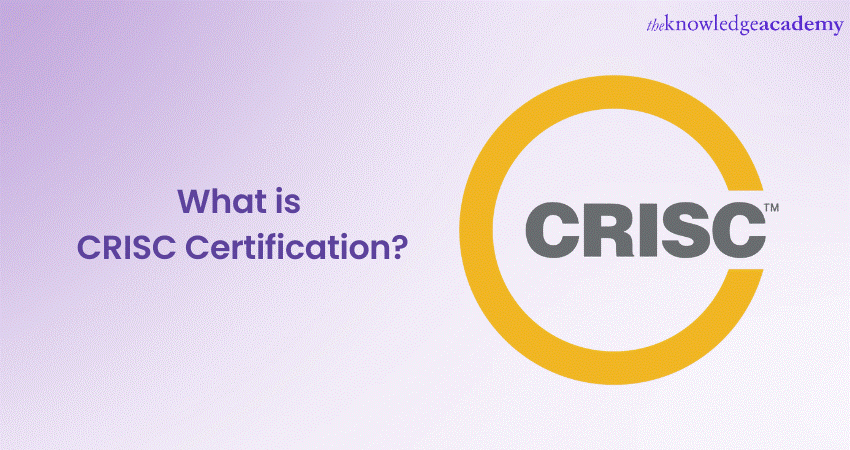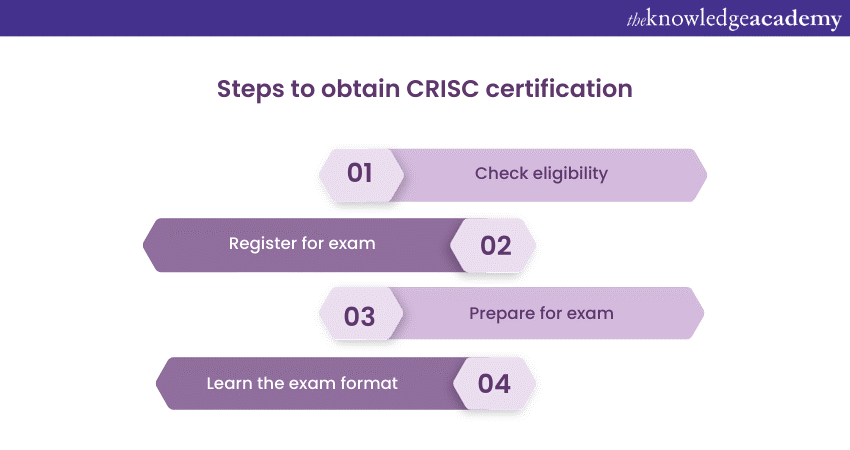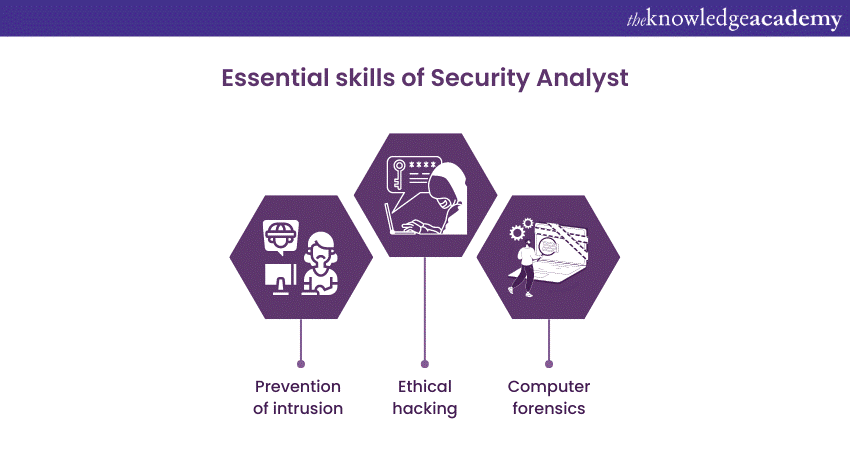We may not have the course you’re looking for. If you enquire or give us a call on 01344203999 and speak to our training experts, we may still be able to help with your training requirements.
Training Outcomes Within Your Budget!
We ensure quality, budget-alignment, and timely delivery by our expert instructors.

The scope of a business can be determined before establishing it, which is why organisations invest in professionals proficient in risk detection and mitigation. If you are an aspirant looking for jobs in the risk management industry, you must have many questions regarding which certification to choose. One of the most asked questions by beginners in the field is, "What is CRISC Certification?".
The threat of cyber-attacks has increased considerably over the past decade. According to Statista, the total number of malware attacks globally reached a whopping 5.5 billion. Thus, businesses are constantly looking for CRISC-certified professionals who can perform effective Risk Management. CRISC stands for Certified in Risk and Information Systems Control. Explore this blog on What is CRISC Certification and gain in-depth knowledge on Information Systems auditing, enabling you to conducting thorough audits.
Table of Contents
1) What is CRISC Certification?
2) Prerequisites for CRISC Certification
3) Benefits of CRISC Certification
4) Steps to acquire a CRISC Certification
5) Job Prospects with CRISC Certification
6) CRISC salary information
7) Conclusion
What is CRISC Certification?
One of the coveted certifications in the Information Technology (IT) sector is the Certified in Risk and Information Systems Control (CRISC). It reflects proficiency in Risk Management. The certification offers the knowledge and skills required to identify risks in business and use effective Information Security methods to manage them. There are four major CRISC domains, and these include:
a) Domain 1 - IT governance
b) Domain 2- IT risk evaluation
c) Domain 3 - Risk response and reporting
d) Domain 4 - Information Technology and security
It is one of the most popular certifications offered by the Information Systems Audit and Control Association (ISACA). The presence of an ISACA Certification on your resume is a testament to an advanced understanding of the IT field, which improves your employment opportunities. Another significant certification offered by ISACA is the Certified Information Security Manager (CISM).
The CRISC Certification is in high demand today owing to the numerous risks businesses face at various levels. Cyber risks are one of the most common threats to organisations' integrity; hence, they invest in hiring CRISC-certified professionals.
Obtaining a CRISC Certification opens multiple avenues of opportunity for professionals in various industries. Although individuals are most attracted to gaining jobs in the IT sector with it, there are aspirants in other fields who also compete for CRISC, and they are as follows:
a) Business Analysts
b) Risk professionals
c) Control professionals
d) Compliance professionals
e) Project Managers
Prerequisites for CRISC Certification
Applicants seeking CRISC Certification from ISACA must meet specific eligibility criteria. These prerequisites include the following:
a) Applicants must have a minimum of three years of expertise in IT, specifically in Risk Management and Information Systems, within two out of the four listed domains.
b) Successful completion of the CRISC Examination is the most basic prerequisite for certification eligibility.
c) All individuals holding a CRISC Certification are required to sign a Code of Professional Ethics, and prospective candidates must adhere to the same guidelines.
d) The Continuous Professional Education (CPE) policy is a set of rules for those seeking the CRISC Certification. It verifies the skills of certificate holders, distinguishes qualified individuals from unqualified ones, and assists management in setting hiring and development standards. To comply, candidates must follow the policy and accumulate a minimum of 20 contact hours each year, reaching a total of 120 contact hours over three years.
Looking to crack your CRISC exams, refer to our blog on "CRISC Exam Questions"
Benefits of CRISC Certification
The significance of Quality Risk Management is increasing with every passing day. As organisations rely more on technology, the possibility of cyber vulnerabilities also increases. Enterprises wish to avoid losing important data that can hinder growth.
CRISC-certified professionals have the skills to identify and eliminate technological risks, as they know the repercussions of leaving such risks unattended. One of the most significant benefits of acquiring the certification is increased job prospects in Risk Management.
The CRISC Certification aims at preparing competent professionals who can improve the standards of organisations by implementing their in-depth knowledge of Risk Management. Here are some of the pros of hiring a CRISC-certified professional for your organisation: Thorough understanding of IT security models, processes, and controls
a) Ability to create effective strategies aimed at eliminating risks
b) The knowledge to build risk-based controls for information systems
c) Adhering to the organisation’s Risk Management and control plans
d) Being capable of handling risk controls and business needs simultaneously
e) Suggesting solutions based on the legal and compliance requirements
Steps to acquire a CRISC certification

The CRISC Certification can be obtained upon passing the examination. It is a computer-based exam, and users can register for it anytime. Let's look at the steps to acquire a CRISC Certification:
1) Register for the exam
Once you are eligible to attempt the CRISC exam, the next step is to register for it. You must visit the ISACA website, select your desired certification, create an account, provide all the necessary information it asks for and schedule your exam date, time, and location.
The examination cost is different for ISACA members and non-ISACA members. While non-ISACA members must pay a price of £607.72, ISACA members must pay a discounted price of £459.79.
2) Prepare for the exam
The preparation for the CRIC exam can be done using multiple study resources. The main topics for the examination are the four domains of CRISC. The percentage of questions that will be extracted from the four domains are as follows:
|
Domain |
Topic |
Percentage |
|
Domain 1 |
Governance |
26% |
|
Domain 2 |
IT risk assessment |
20% |
|
Domain 3 |
Risk response and reporting |
32% |
|
Domain 4 |
Information technology and security |
22% |
ISACA itself provides multiple study materials. Here are some of the training classes and courses offered by ISACA to help candidates prepare for the exam:
a) CRISC online review course: The CRISC online review course, which helps candidates prepare for the exam, focuses on all four domains. The cost of the course is as follows:
|
|
Non-ISACA member |
ISACA member |
|
Course cost |
£715.67 |
£635.71 |
b) CRISC training course: ISACA offers a virtual training session that helps candidates prepare for the exam. The cost of availing of this provision is different for non-ISACA members and ISACA members and is as follows:
|
|
Non-ISACA member |
ISACA member |
|
Standard cost |
£955.56 |
£795.63 |
|
Early bird cost |
£915.58 |
£755.65 |
Once candidates have registered for the exam, they will receive a guide containing all the examination details, like dates, deadlines, examination topics, rules and regulations, etc.
3) Learn the exam format
Two hundred questions will be given to be cleared in the exam within four hours. The result of the examination will depend on your scores, which will be scaled. Scaled scores refer to the raw scores of candidates being converted into a standard scale, and ISACA uses a scale from 200 to 800 to report scores. Candidates will be given four chances to pass the exam in a year.
4) Application for the CRISC Certification
Post examination results, candidates are given a five-year period within which they can apply for the certification. If applicants fail to meet this timeframe, they must undergo the examination once more to qualify for certification.
ISACA also considers work experience as an important aspect. A minimum of three years of work experience is required, and this should occur within a ten-year timeframe before taking the certification examination or within the five-year period following the release of examination results to be deemed valid. If a candidate fulfils all the criteria and yet faces rejection for CRISC Certification, they have the option to request an appeal of the decision.
Excel in Risk Management and become a high-valued employee with our CRISC Training now!
Job prospects with CRISC Certification
Aspirants in the IT industry are always looking for high-paying jobs, and a CRISC qualification is bound to lead them to it. Here are some of the jobs that can be obtained with the certification:
Risk Manager
A Risk Manager is in charge of assessing and managing risks in a business. They shoulder the responsibility of developing strategies that help eliminate risks and improve the functionality of companies.
Organisations can face risks like data breaches, financial loss, or asset damage. Risk Managers use multiple strategies and methods to improve the situation and protect the organisation from vulnerability.
CRISC-certified professionals will be highly valued for the position of Risk Manager and will be preferred over their peers who might need to hold the certification. A Risk Manager earns an average of £59,870 in the United Kingdom.
Security Engineer
Security Engineers protect an organisation's computer systems from potential cyber-attacks. They develop effective strategies to tackle the various ways cyber attackers attempt to tear down virtual walls and extract confidential data.
They are responsible for creating, monitoring, and updating the security protocols of enterprises as well. Another major responsibility of this job role is to develop computer security strategies and engineer comprehensive cybersecurity architecture. The average salary for a CRISC-certified Security Engineer is £62,531.
Security Analyst

A Security Analyst identifies the errors in a company’s security system and produces effective and efficient ways to tackle them. They prevent the leakage of critical company data and assets.
They are responsible for conducting security assessments, monitoring access and performing internal and external audits. Additionally, they must verify and communicate with third-party vendor security to meet the stakeholders’ requirements. A Security Analyst earns up to £41,761 on average in a year.
Some of the skills involved in the role of a Security Analyst are:
a) Prevention of intrusion: This involves monitoring traffic to detect any threats and responding to them according to the policies and procedures.
b) Ethical hacking: This aims to detect weak points and potential threats to essential data of the organisation.
c) Computer forensics: This is an important skill that must be mastered by aspiring Security Analysts as it allows them to create evidence of the possibility of a breach.
CRISC salary information
The average annual salary for a CRISC-certified professional in the UK is around £75,000. This places CRISC holders among the highest-paid Information Security professionals. The salary range for CRISC professionals can vary significantly depending on experience, location, and job title. For instance, entry-level CRISC professionals may earn around £50,000 annually, while senior-level CRISC professionals with extensive experience can command salaries of up to £120,000 or higher.
Here's a breakdown of average CRISC salaries for different job titles:
a) Information Security Analyst: £44,219
b) Information Security Manager: £62,000
c) Information Security Specialist: £52,072
d) Senior IT Auditor: £90,702
e) Chief Information Security Officer (CISO): £176,493
Here's a general overview of salary ranges based on experience:
a) 0-3 years of experience: £50,000 - £60,000
b) 4-7 years of experience: £60,000 - £80,000
c) 8+ years of experience: £80,000 - £120,000 or higher
Conclusion
The CRISC Certification is a popular qualification among IT professionals who wish to explore jobs in risk management. We hope this blog has helped you answer questions like ‘What is CRISC Certification?’ and learn more about the CRISC benefits and job prospects.
Learn about risk identification, assessment, and response by signing up for our Certified in Risk And Information Systems Control (CRISC) Course today!
Frequently Asked Questions

Achieving CRISC Certification significantly enhances your earning potential in cybersecurity. CRISC holders demonstrate expertise in managing information systems risks, making them invaluable to organisations. With this globally recognised certification, you become a trusted professional capable of identifying and mitigating IT risks.
Employers value CRISC as a testament to your Risk Management skills, leading to increased job opportunities and higher earning potential in roles such as:
a) Risk Analysts
b) Information Security Managers
c) Compliance Officers

The CRISC Certification significantly enhances job stability and security. It validates expertise in Risk Management and Information System controls, making professionals valuable assets in the eyes of employers. Holding CRISC demonstrates a commitment to best practices in risk identification, assessment, and mitigation.
Organisations increasingly seek CRISC-certified individuals to fortify their defence against cyber threats, thereby bolstering job security. This certification opens doors to roles like IT Risk Management and governance, contributing to a resilient and secure career path in the dynamic field of information systems.

The Knowledge Academy takes global learning to new heights, offering over 30,000 online courses across 490+ locations in 220 countries. This expansive reach ensures accessibility and convenience for learners worldwide.
Alongside our diverse Online Course Catalogue, encompassing 17 major categories, we go the extra mile by providing a plethora of free educational Online Resources like News updates, Blogs, videos, webinars, and interview questions. Tailoring learning experiences further, professionals can maximise value with customisable Course Bundles of TKA.
The Knowledge Academy’s Knowledge Pass, a prepaid voucher, adds another layer of flexibility, allowing course bookings over a 12-month period. Join us on a journey where education knows no bounds.

The Knowledge Academy offers various CRISC Training courses , including Certified In Risk And Information Systems Control (CRISC) course. These courses cater to different skill levels, providing comprehensive insights into CRISC Certification.
Our IT Security & Data Protection blogs covers a range of topics related to CRISC Training, offering valuable resources, best practices, and industry insights. Whether you are a beginner or looking to advance your Data Protection skills, The Knowledge Academy's diverse courses and informative blogs have you covered.
Upcoming IT Security & Data Protection Resources Batches & Dates
Date
 Certified in Risk and Information Systems Control (CRISC)
Certified in Risk and Information Systems Control (CRISC)
Sat 23rd Nov 2024
Mon 9th Dec 2024
Mon 27th Jan 2025
Mon 7th Apr 2025
Mon 14th Jul 2025
Mon 24th Nov 2025







 Top Rated Course
Top Rated Course



 If you wish to make any changes to your course, please
If you wish to make any changes to your course, please


